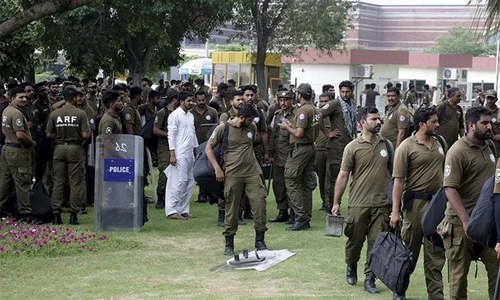LAHORE: The appointments to key posts in the police department, allegedly violating the criteria set under the Police Order 2002, have suddenly reignited discussion among the Police Service of Pakistan (PSP) officers.
In formal and informal meetings, officers are discussing the rules, particularly the police order that has clearly defined the roles of national, provincial and district public safety commissions to appoint officers.
Recently, a retired inspector general of police (IGP) stirred a debate on a private forum while commenting on the prevailing system supporting the appointment of junior provincial police officers and that too, he believed, on political grounds.
The recent appointments of IGPs in Azad Jammu and Kashmir, Gilgit-Baltistan, Punjab and Islamabad — already being discussed in the police circles — are said to have triggered the former police chief to comment on the appointment criteria.
At centre of debate is prevailing system of posting junior PPOs on political grounds
A police officer privy to the discussion said the retired officer’s comment led to a barrage of reactions from other officers. Some PSP officers rallied in support of the retired officer, while many others opposed his remarks.
A serving officer expressed displeasure at the comment with over 25 officers serving under him following suit in solidarity with their boss.
The conversation reached senior officers who also started discussing it among themselves.
Such overwhelming reaction from the PSP officers also highlighted the core function of the Police Order 2002 that has clearly defined the criteria to fill the top slots in the department across the country.
“I think the police department is struggling to appoint the best officers in all ranks,” commented retired IGP Sarmad Saeed.
Talking to Dawn, he said the problem starts with appointments on top positions to those of station house officers (SHO). “If you start violating the criteria once while appointing provincial police officers, the junior officers will definitely demand the posting of their choice on the same pattern,” he stressed.
He added that successive governments mostly watched their own interests while appointing police officers against important field posts instead of protecting the rights of the masses.
“The Police Order 2002 enunciates the criteria for appointment on key positions with an important role of national, provincial and district public safety commissions,” the former IGP further said.
However, unfortunately, he said, the commissions were yet to be made functional but positions in the department were being filled nonetheless, assigning a prime role to the federal and provincial governments.
“On many occasions, successive rulers have claimed that they reserve the right to make postings against top slots, but I strongly reject this notion because discretion comes in when rules go silent,” Mr Saeed said.
Senior lawyer Asad Jamal said a seniority list is prepared either under the Police Service of Pakistan Rules or the Civil Servants Rules, as well as relevant rules for provincial cadres.
As far as an IGP’s appointment under the Police Order is concerned, a provincial government can appoint an officer out of the three names recommended by the Centre. “There’s no requirement of considering seniority for selecting an officer out of the names recommended,” he added.
This law is questionable in more ways than one: the federal government would always recommend an officer from the cadres established in the Police Service of Pakistan and provincial cadres would not be considered.
But when the police is a provincial subject, why should the provincial cadres rising from the lowest ranks be rendered incapable of becoming the top police officer in the province? “I think the institution of police needs to be fundamentally organised at the provincial and local levels and held accountable by an external body. I think proper accountability, training and education of the police will make it a better institution,” Mr Jamal observes.
The seniority factor is redundant because good officers alone should expect to rise within the department and not the non-performing seniors.
Former Lahore capital city police officer and retired additional IGP, Amin Wains, suggested further amendments to the Police Order to meet the future challenges. The top police hierarchy was not on the same page over several clauses and sections of the law, he believed.
“Particularly, the criteria for postings must be reviewed to ensure the appointment of brilliant officers,” Mr Wains said, adding that posting of the head of a district is instrumental in providing relief to the masses or bringing reforms.
“I think a new system should be devised to impart training to a police officer for at least a month about the district he is to head,” the former CCPO said.
He added that the officer must be completely updated about the district profile, its political dimensions, crime pattern and other necessary details to get the required results.
The former CCPO said financial and operational autonomy was the need of the hour to improve the police’s operations.
“All stakeholders should sit together to review the Police Order 2002 with the prime purpose of awarding the police responsibility with authority,” he concluded.
Published in Dawn, July 24th, 2021















































